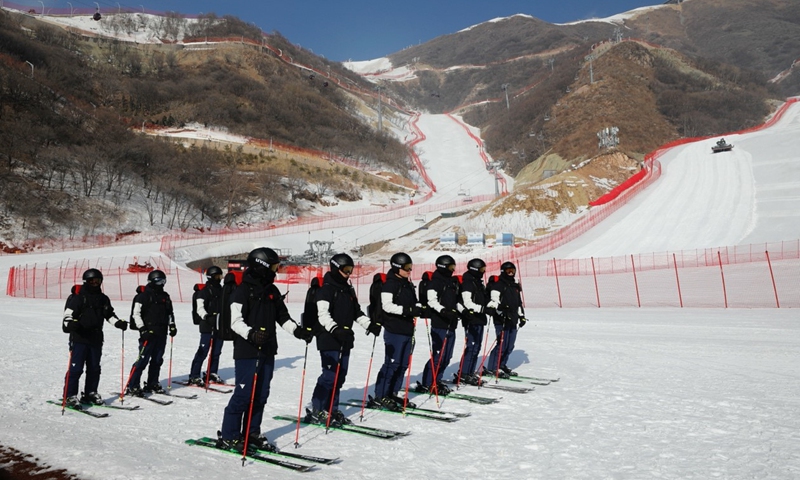China fulfills commitment to host green Olympics through action; leaves ‘sustainable Olympic legacy’

A special team of winter electricity maintenance technicians is ready for the Winter Olympic Games 2022 in Yanqing's National Alpine Skiing Centre Photo: State Grid's Winter Olympics maintenance group
The green and low-carbon practices seen throughout the Beijing 2022 Olympic Winter Games have set a good example for building a beautiful China, leaving a rich and valuable sustainable Olympic legacy for future generations, Wang Jinnan, head of the Chinese Academy of Environmental Planning under the Ministry of Ecology and Environment said at Friday's press briefing. Wang noted that China has fulfilled its commitment to host a green Olympics in practice.
For the venue construction in the Yanqing and Zhangjiakou competition zones, there has been an emphasis on delivering a green Winter Olympics, balancing the impact on the environment from the source of design with protective measures such as avoidance, mitigation, reconstruction and compensation, Wang said.
All venues used during Beijing 2022, including Yanqing venues, will be powered by green electricity. "It will leave a very good legacy that will facilitate Beijing's low-carbon transition," Ma Jun, founder of the Institute of Public and Environmental Affairs, told the Global Times in a previous interview.
Beijing 2022 is the first carbon neutral Olympic Games with venues powered by renewable energy; combined with energy-saving and clean-energy vehicles accounting for 84.9 percent of the total number of vehicles used for the event, the highest ever, according to Beijing authorities.
As the first "Dual Olympic City," Beijing has sealed a great achievement in improving air quality. In 2021, all six major pollutants in Beijing met recognized global standards for the first time, with the concentration of fine particulate matter reduced to 33 micrograms per cubic meter, decreasing 40 percent from 2017, according to the authorities. The city added 62 days considered to have good air quality over 2017 levels.
Meanwhile, Beijing Blue has become normal and Beijing's air quality has reached the best level since PM2.5 was first monitored.
The Beijing Organizing Committee for Beijing 2022 and the hosting cities of Beijing and Zhangjiakou in neighboring Hebei Province made joint efforts to actively promote the low carbon projects and fully supply low carbon technologies achieving carbon neutrality through low carbon of energy, venue construction and transportation, according to Wang.
The achievement of hosting a green Olympic has been fully recognized by the international community, noted Wang.
Beijing 2022 will be the "carbon neutral template" for future global events, business information provider S&P Global Inc said in a recent report sent to the Global Times on Thursday.
The games features a hydrogen fueled Olympic torch and over 800 hydrogen vehicles, 100 percent renewable energy plants to support the event venues and 1.7 million carbon credits to offset emissions.
The report noted that while this is not the first sporting event or Olympics to reduce its carbon footprint, this Games has set the template for how future global events will be conceptualized, focusing first on reducing emissions instead of relying on offsets, which industry experts admit is a last resort.
If the carbon credits prepared for the games are not used elsewhere, the Beijing 2022 will have surplus offsets, the S&P report said.
The International Olympics Committee is requiring the Games to be "climate positive" from 2030. The 2024 Paris Olympics and Los Angeles 2028 are making plans toward that direction.
Beijing and Zhangjiakou, where event venues are located, have turned climate resources and advantages of ice and snow into new development opportunities, unlocking new value for ecological products.
Relevant departments will carry out integrated protection and restoration of mountains, rivers, forests, farmland, lakes, and grasslands to increase access and quality of the natural environment.
A total of 35 major ecological protection and restoration projects will be conducted in the Beijing-Tianjin-Hebei water conservation area, the Qilian Mountains, the Changbai Mountains, and the Three Gorges on the Yangtze River and other areas with important ecological functions, Wang said at the press briefing. In East China's Jiangsu and Shandong provinces, the ecological restoration of coal mining subsidence areas and mining areas has been promoted.


